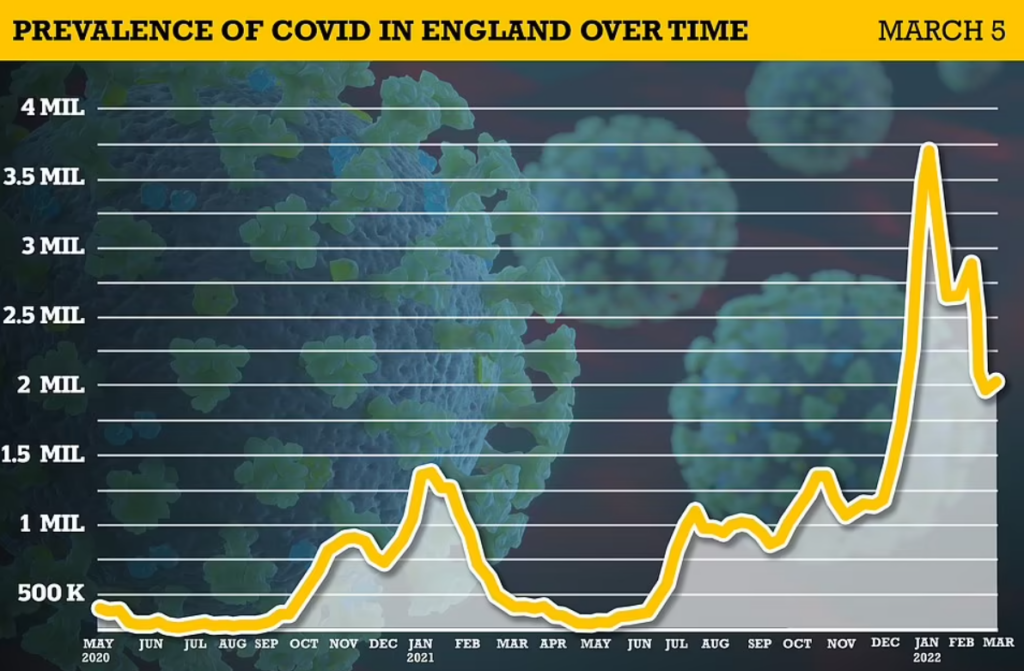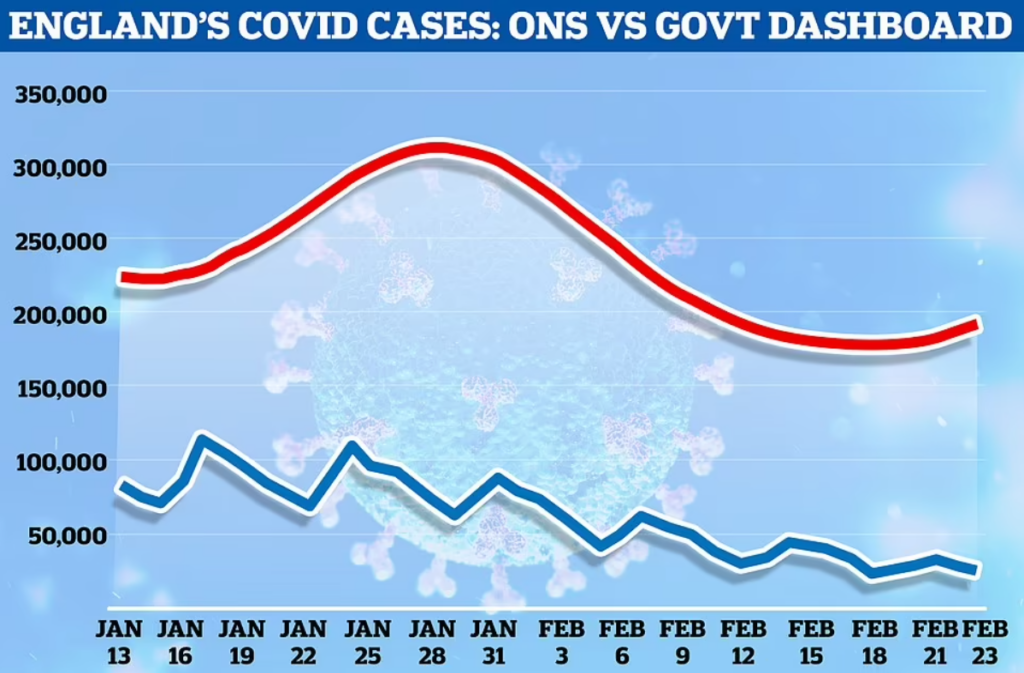A surge in Covid infections was always to be “expected” following the easing of Covid restrictions in England, Health Secretary Sajid Javid has said. MailOnline has more.
Sajid Javid said that the U.K. remains in a “very good position” – despite hospital admissions also starting to creep up in the last week – but he urged adults eligible for a booster vaccine to come forward and get the jab.
The latest data from the Office for National Statistics Covid Infections Survey showed an increase in cases across the whole of the U.K.
The surveillance report also found infections were rising in England before all Covid laws were lifted on Freedom Day, suggesting the transition towards ‘living with Covid’ is not solely to blame for the latest surge.
Meanwhile, Mr Javid said that a ‘handful’ of cases of the so-called Deltacron variant had been identified in the UK, but were “not of particular concern”. Roughly 99.9% of all infections in Britain are of the Omicron variant, he added.
Mr Javid told Sky News: “We keep the situation very carefully under review.”
As MailOnline points out, Sajid Javid’s claim that the rise is linked to the end of restrictions (mainly the requirement to self-isolate) on February 24th is contradicted by the ONS data, which show infections rebounding from around February 19th (see above).

Or perhaps Mr. Javid was referring to the end of Plan B restrictions (mask mandate and vaccine passports) on January 27th? However, Scotland still hasn’t lifted these measures, and its infection rate rose earlier and faster than England’s.


Or perhaps Mr. Javid was referring to “more social mixing” in recent weeks? However, as Michael Simmons points out:
There aren’t yet signs in the data that social mixing is increasing all that much: SAGE’s preferred survey for mixing (CoMix) shows us having on average three contacts per day, in line with the average at the end of lockdown. And Google mobility data for workplaces show travel is still around a quarter down on before the pandemic, whilst recreational travel is still 10% lower on a weekly average.
On rising hospital admissions, MailOnline states: “MailOnline‘s analysis of NHS figures suggests that a majority of newly occupied Covid beds are ‘incidental’ – when a person tests positive after being admitted for a different illness.”
Two years in and Government ministers still lazily assume that what make the difference in rising and falling infections are the measures they impose or lift – despite the data frequently contradicting these claims in the most blatant ways.
Isn’t it more likely that the recent rise is linked to the rise of the BA.2 subvariant of Omicron?
That explanation at least is consistent with the data, as opposed to the interventionist fantasies of politicians and their scientific advisers, which assume without evidence that it’s all about them and what they do and don’t do.
As infections rise again, it’s worth keeping in mind that deaths have been running below average all winter and remain so, meaning that actually we should stop worrying about what Covid infections are doing altogether as the disease is, to quote the Danish Government, not “socially critical”.
















To join in with the discussion please make a donation to The Daily Sceptic.
Profanity and abuse will be removed and may lead to a permanent ban.
Well done Chile!
It’s quite possible there was some reasonable stuff in there but they’ve obviously overreached – huge own goal.
Surely a mistake to try and cover too much. The US remains the model to follow – the main aim was to set out the limits of government/state power.
Considering that all of the the woke nonsense emanates from the USA, that’s a very dubious claim.
Not sure how that follows. I don’t see the role of a constitution as preventing “woke nonsense” but setting out a workable structure of government that strikes the right balance between the powers and reach of the state and those of the individual, which will undoubtedly be abused and come under attack and may fail, but it’s worth trying, and IMO the US is the best example and the one that has endured and provided the best outcome. Of course the US isn’t perfect, or how we’d like it to be, but it’s notable to me as the rich “liberal” “democracy” with the most robust active movement pushing back against wokeism and its ilk. The political right in the US, which has mainly provided resistance against covid folly and evil, is mainstream both in politics and media. Not so much in the UK and continental Western and Central Europe.
It doesn’t follow at all, it’s just a fact: This is a genuinely American phenomenon and is mostly about inherently American issues which don’t really exist in other parts of the world, except insofar ardent fans of the so-called American left are cosplaying what their idols do.
Taking a bit of a broader perspective, the USA is also traditionally a very aggressive power principially hell-bent on destroying all political systems which differ from the American one, except that this doesn’t always work and/ or sometimes turns out to cost more money and effort than the American public is willing to spend on it (eg, in Afghanistan).
My point was about the best approach to construct a constitution, or what I think one should contain/focus on, as it seemed to me they had made the mistake in Chile of chucking in all sorts of stuff that’s currently trendy that IMO has no place in a document/structure that’s meant to endure over time. Nothing to do with wokery per se.
As far as the USA goes, they are indeed not overly pleasant to their enemies nor to those that are not close allies. More pleasant to their own citizens. This they share with most great powers now and throughout history (though many of them were not that nice to their own people either).
The USA isn’t exactly pleasant to their allies, either. Eg Eisenhower breaking the neck of the British empire by siding with Egypt during the so-called Suez crisis. But that’s sort-of besides my point which is still that the woke movement is as American as hamburgers and black friday. That’s a political movement the political organization of the USA gave birth to. Which is not exactly an argument for combatting it by aping this political organization.
“ That’s a political movement the political organization of the USA gave birth to.”
Well, correlation is not causation, and I don’t really see wokeism as anything especially American or a consequence of anything in their structure of government or bill of rights. They tend to have more extremes there than in many other places. I’m not sure why they seem to have wokeism there so badly. Maybe a follow on from the legacy of slavery and racism then anti-racism, a victim culture developed/was encouraged/exploited. A big topic I think. But as I said, the opposition there is more robust – by comparison we’re just rolling over here. I’d still rather live in the USA than anywhere else except England, though these days that’s not saying much.
Regarding US allies, I would rather be an ally of the US than China, though that’s not saying much either.
But not because of the constitution.
In Chile they are sufficiently poor, they are more prone to properly question and think about these things before spending money. It seems we in the UK won’t have to worry about woke politics for much longer either.
And of course, when you write “poor” you’re probably referring to so-called “public finances” being poor, in other words, the government is not effective at the taxing the people. I would hazard a guess that regular Chileans are better than many in “The West” at preserving their wealth and keeping “their government’s” hands off it, and as such, there is much more of a culture of being sceptical about governments, and they are more practised at making better financial decisions (and decisions in general) for themselves.
Measures of a country’s wealth are an essentially arbitrary thing, because they will never properly take individual wealth into account; individuals are not citizens of a country by any natural mechanism.
And “poor” countries will have less well-developed mechanisms to measure it anyway. And the measures come from governments.
As Oscar Wilde said, “Patriotism is the last refuge of the scoundrel.”
Do my layperson’s ramblings make sense?
It got firmly rejected, but do not presume they won’t keep voting on some proposals till this woke bilge is passed.
To be honest, there did seem to be some bits that might have been good for indigenous people who get a pretty raw deal in South America. The trouble is that the young new Prez wanted to appeal to everyone and I suspect there is a large contingent of highly conservative voters in Chile who still have pictures of Generalissimo Pinochet on their dining room walls and couldn’t stand this sort of lefty posturing. Still, they’ll work on a new draft and try and ram it home in another year.
They serve great ice creams in Santiago – I managed to drop mine three steps out of the ice cream parlour because it was such an enormous serving, a mini-Andes Mountain Range of ice cream.
The Chileans need to prepare to vote again so that next time they can return the correct result.
This is a new sort of democratic process where you keep hitting the round peg repeatedly until finally it assumes a squarish shape and slots into the square hole. There…done. Democracy in action.
That’s it exactly.
The tyranny of Pridehttps://www.spiked-online.com/2022/09/04/the-tyranny-of-pride/It’s time for a fightback against rainbow authoritarianism.
Yellow Boards By The Road
For the love of humanity … My patience is running thin for turkeys that vote for a fifth Christmas. .
Tuesday 6th September 11am to 12pm
Yellow Boards
Junction A321 Lower Wokingham Rd &
B3348 Dukes Ride
Crowthorne RG45 6NZ
Wednesday 7th September 3pm to 4pm
Yellow Boards
Junction B3034 Forest Road &
A330 Hatchett Lane
Ascot SL5 8QE
Stand in the Park Sundays 10.30am to 11.30am – make friends & keep sane
Wokingham
Howard Palmer Gardens Sturges Rd RG40 2HD
Bracknell
South Hill Park, Rear Lawn, RG12 7PA
Telegram http://t.me/astandintheparkbracknell
62% reject poverty and discrimination, shock horror!
(I wonder if the UK will be recognised as a “plurinational” state, with the rights of the indigenous populations to their land and resources recognised?).
I don’t think it will be too long before the Albanian brothers claim, via some convoluted, Orwellian and historical chicanery their indigenous rights to these islands.
Thank goodness there is at least one country with its head screwed on right.
Let me guess …. 36 yr old President Boric, who himself cannot possibly be very experienced at that age, is a WEF Young Leader?
I’m not sure that he is…I did a search, several searches, and couldn’t find a connection. Still he’s young enough to be invited in…